Sleep hygiene is the cornerstone of nocturnal rejuvenation. In the midst of the whirlwind of daily life, a sanctum of serenity at night is more than a luxury; it is a necessity. Unlock restful nights. Easily delves deep into the art and science of creating the perfect evening routine. This guide explains the subtle nuances of preparing for a night in which sleep gently descends, enveloping you in its peaceful embrace. From optimizing your environment to fine-tuning your pre-sleep rituals, every element is designed to create a safe haven for dreams to flourish. Discover how to turn your bedtime into a pathway to greater wellness and vitality.
- Introduction to Sleep Hygiene
- Sleep hygiene is the foundation of good health.
- Understanding Sleep Hygiene: What It Actually Means
- Sleep Hygiene's Crucial Role in Daily Life
- Sleep Hygiene: Key Components for Restful Nights
- The Science of Sleep Hygiene: How It Works
- Myths and misconceptions about sleep hygiene
- Assessing Your Current Sleep Hygiene: A Self-Assessment
- Setting the Stage: Getting Ready for a Deep Dive into Sleep Hygiene
- Environmental and lifestyle factors that influence sleep hygiene
- Sleep hygiene and the bedroom environment
- Optimized lighting for improved sleep hygiene
- The role of sound in sleep hygiene
- Temperature and Humidity: Their Influence on Sleep Hygiene
- Sleep Hygiene: The Value of Bed Quality
- Aromatherapy and Sleep Hygiene: Scents to Relax
- Technological Distractions: Managing Devices for Better Sleep Hygiene
- Dietary Supplements and Their Impact on Sleep Hygiene
- Behavioral and psychological adjustments for improved sleep
- Creating the Ideal Nighttime Ritual: Sleep Hygiene and Evening Routines
- Dietary habits and their impact on sleep hygiene
- The influence of exercise on sleep hygiene is significant.
- Mindfulness and Relaxation Techniques to Improve Sleep Hygiene
- Effective Sleep Hygiene: Mental Health's Role
- Managing stress and anxiety for better sleep
- The impact of both legal and illegal substances on sleep quality
- Sleep Hygiene: Preparing Your Mind for Rest
- Demographic Differences in Sleep Hygiene
- Gender differences in sleep hygiene
- Ethnic and Racial Differences in Sleep Practices
- The effects of different life stages on sleep hygiene are significant.
- Sleep Hygiene for Shift Workers: Special Considerations
- Treating chronic insomnia and sleep hygiene
- Sleep Hygiene for Non-Traditional Work Schedules
- Holistic Approaches to Improve Sleep Hygiene
- Sleep Hygiene for Children and Adults: Key Differences
- The article discusses advanced strategies and challenges in sleep hygiene.
- Long-term Sleep Tracking: Benefits for Sleep Hygiene
- Cognitive Behavioral Therapy (CBT-S) and Sleep Hygiene
- Common Obstacles to Maintaining Good Sleep Hygiene
- We are troubleshooting sleep issues using sleep hygiene techniques.
- When to seek professional help for sleep hygiene concerns
- The effects of aging on sleep hygiene are significant.
- The impact of medication on sleep hygiene is a significant topic.
- Seasonal Affective Disorder and Sleep Hygiene
- Cultural, economic, and community influences on sleep hygiene
- Cultural variations in sleep hygiene practices
- Psychological barriers to good sleep hygiene
- Economic factors influencing sleep hygiene
- Educating others on sleep hygiene
- The Future of Sleep Hygiene: Trends and Innovations
- Personal Stories: Transformations Through Improved Sleep Hygiene
- Creating a Better Sleep Hygiene Community
- The relationship between sleep hygiene and immune system function
- Sleep Hygiene: A Step-by-Step Guide to Easily Achieving Restful Nights
- Frequently Asked Questions About Sleep Hygiene: Effortlessly Unlock Restful Nights
- What is sleep hygiene?
- Why is proper sleep hygiene important?
- How can I improve my sleep environment so that it promotes better sleep hygiene?
- What are the best pre-sleep routine tips?
- How does diet influence sleep hygiene?
- Is it okay to nap during the day if I follow good sleep hygiene?
- What should I do if I am unable to fall asleep?
- How does exercise affect sleep hygiene?
- Conclusion
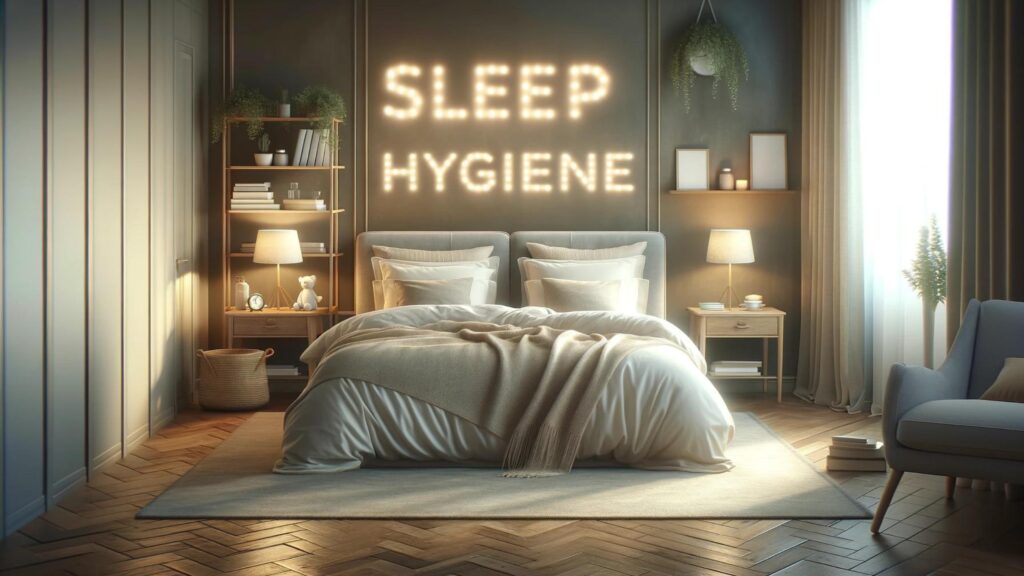
Introduction to Sleep Hygiene
Sleep hygiene is the foundation of good health.
Sleep hygiene is more than a practice; it’s the foundation of a healthy life. It entails developing a set of habits that promote consistent, uninterrupted sleep, resulting in numerous health benefits. By improving the quality of your sleep, you not only improve your mental clarity and emotional resilience but also strengthen your body’s defenses against disease. Adopting effective sleep hygiene practices is the first step toward overall well-being.
Understanding Sleep Hygiene: What It Actually Means
Sleep hygiene refers to the rituals, behaviors, and environmental factors that precede a good night’s sleep. It’s more than just avoiding caffeine before bedtime; it’s a carefully planned routine that prepares your mind and body for a good night’s sleep. Understanding sleep hygiene entails acknowledging its role in synchronizing your circadian rhythms, thereby optimizing your sleep patterns for maximum health benefits.
Sleep Hygiene’s Crucial Role in Daily Life
Neglecting sleep hygiene can disrupt your daily life and jeopardize your health. For cognitive function, emotional control, and physical health, good sleep hygiene is essential. It has an impact on everything, including your decision-making ability and how you interact with others. Practicing good sleep hygiene is essential for anyone who wants to live a productive, happy life.
Sleep Hygiene: Key Components for Restful Nights
Maintaining a consistent sleep schedule, developing a bedtime routine that signals your body to relax, and optimizing your bedroom environment for comfort and tranquility are all important aspects of sleep hygiene. These elements work together to promote faster sleep onset and prevent nighttime awakenings, paving the way for deep restorative sleep.
The Science of Sleep Hygiene: How It Works
Sleep hygiene works by synchronizing your body’s internal clock with environmental cues, resulting in better sleep quality and duration. This includes regulating light exposure, which influences melatonin production, as well as stress management through relaxation techniques. The science of sleep hygiene is based on understanding and manipulating physiological processes to your advantage.
Myths and misconceptions about sleep hygiene
Common myths, such as the belief that people require less sleep as they age, can impede effective sleep hygiene. Another misconception is that a night of alcohol-induced sleep is restful, when in fact alcohol impairs the sleep cycle, lowering the quality of rest. Dispelling these myths is critical for developing a proper understanding of what constitutes effective sleep hygiene.
Assessing Your Current Sleep Hygiene: A Self-Assessment
To truly understand and improve your sleep hygiene, start with a self-assessment. Consider your bedtime routine, physical sleep environment, and daily habits that may influence sleep, such as caffeine consumption and screen time. Evaluating these factors honestly will help you identify areas for improvement and tailor your sleep hygiene practices accordingly.
Setting the Stage: Getting Ready for a Deep Dive into Sleep Hygiene
Preparing to improve your sleep hygiene entails more than simply changing your bedtime. It entails making a commitment to prioritizing sleep and making the necessary lifestyle changes to support that goal. As we delve deeper into the nuances of sleep hygiene, consider each component of your routine as a lever that you can adjust to enhance your journey to optimal health and well-being.

Environmental and lifestyle factors that influence sleep hygiene
Sleep hygiene and the bedroom environment
Creating a bedroom sanctuary that encourages sleep hygiene is critical. Every aspect of your bedroom, including the color of the walls, the texture of your bed linen, and the amount of ambient noise, can affect the quality of your sleep. To improve your sleep environment, focus on reducing clutter and distractions, ensuring that your bedroom is a peaceful haven for relaxation and rest.
Optimized lighting for improved sleep hygiene
Lighting regulates our sleep and wake cycles. To improve sleep hygiene, use dim, warm lights in the evenings to signal your brain that it’s time to unwind. Consider using blackout curtains to block out external light sources and low-wattage bedside lamps that emit a soft glow, creating a calming environment conducive to sleep.
The role of sound in sleep hygiene
Noise can disrupt sleep, but the right sounds can also improve sleep hygiene. Consider using white noise or soft, rhythmic sounds to mask disruptive noises. Devices that simulate the sound of rain, ocean waves, or a gentle breeze can help create an acoustic environment conducive to deep and restful sleep.
Temperature and Humidity: Their Influence on Sleep Hygiene
Temperature and humidity have a significant impact on how comfortable your sleeping environment is. Most people sleep best in a slightly cool room (around 65 degrees Fahrenheit) with good ventilation. High humidity levels can make your bedroom feel stuffy and disrupt breathing patterns, so keeping a balanced humidity level is critical for good sleep hygiene.
Sleep Hygiene: The Value of Bed Quality
Investing in high-quality mattresses and pillows is essential for good sleep hygiene. The ideal mattress should keep your spine in a natural alignment, while pillows should promote a comfortable head and neck position. Consider your bedding’s firmness, material, and age as important factors in achieving uninterrupted sleep.
Aromatherapy and Sleep Hygiene: Scents to Relax
Aromatherapy can dramatically improve your sleep hygiene by creating a relaxing environment. You can diffuse or incorporate essential oils like lavender, chamomile, and sandalwood into your bedtime routine. These scents work by stimulating the nose’s smell receptors, which then send messages to the nervous system to relax.
Technological Distractions: Managing Devices for Better Sleep Hygiene
In today’s digital age, screens are a major disruptor of sleep hygiene. Phones, tablets, and computers emit blue light that can disrupt melatonin production, making it difficult to fall asleep. To improve sleep hygiene, set a digital curfew at least an hour before bedtime and instead engage in relaxing activities such as reading or meditation.
Dietary Supplements and Their Impact on Sleep Hygiene
Certain dietary supplements can help improve sleep hygiene. Melatonin, magnesium, and valerian root are popular supplements for regulating sleep patterns and improving sleep quality. However, before starting any supplement, it’s crucial to consult with a healthcare provider to ensure its correct and safe use in the context of your overall health and sleeping habits.
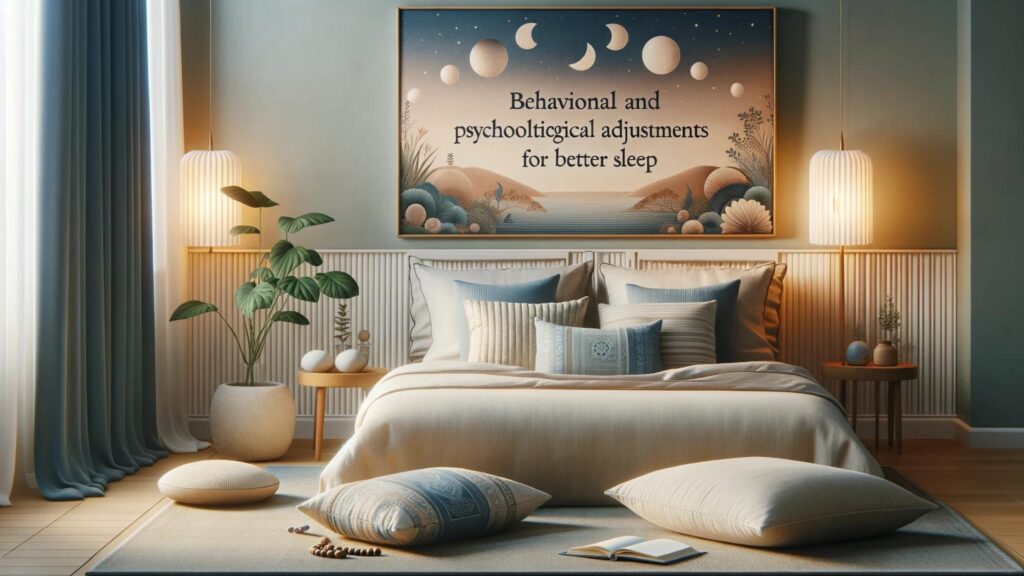
Behavioral and psychological adjustments for improved sleep
Creating the Ideal Nighttime Ritual: Sleep Hygiene and Evening Routines
A well-structured evening routine is a crucial component of effective sleep hygiene. Begin by turning down the lights and engaging in a relaxing activity, such as reading or taking a warm bath. This signals to your body that it’s time to relax. Avoid stimulants and blue-light-emitting electronic devices as part of your ritual because they can interfere with your body’s natural sleep preparation. Instead, choose activities that lower cortisol levels and boost melatonin production, preparing for a restful night’s sleep.
Dietary habits and their impact on sleep hygiene
What you eat influences how you sleep. Consuming heavy meals or caffeine-containing beverages close to bedtime can impair your body’s ability to fall asleep. To promote better sleep hygiene, incorporate magnesium- and tryptophan-rich foods into your dinner, as these nutrients aid in the production of serotonin and melatonin. Avoid alcohol because, despite its initial sedative effects, it can cause fragmented sleep patterns and decreased sleep quality.
The influence of exercise on sleep hygiene is significant.
Regular physical activity greatly improves the quality of your sleep. However, timing is critical. Vigorous exercise too close to bedtime can be counterproductive because it increases your heart rate and adrenaline levels. Aim to schedule workouts at least three hours before you intend to retire. This allows your body to re-establish homeostasis and your mind to relax naturally, creating a conducive sleep environment.
Mindfulness and Relaxation Techniques to Improve Sleep Hygiene
Meditation, deep breathing exercises, and progressive muscle relaxation are all mindfulness and relaxation techniques that can help you improve your sleep hygiene significantly. These practices help to reduce bedtime anxiety and racing thoughts, which are common causes of sleep disturbances. By incorporating these techniques into your nightly routine, you can improve your mental state while also preparing your body for deep, uninterrupted sleep.
Effective Sleep Hygiene: Mental Health’s Role
The relationship between mental health and sleep is inextricable. Psychological issues such as depression and anxiety can cause sleep disturbances, and vice versa. Proactively addressing mental health issues through therapy, counseling, and medication, as needed, can result in significant improvement in sleep hygiene. Ensuring mental well-being establishes a solid foundation for achieving consistent, quality sleep.
Managing stress and anxiety for better sleep
Stress and anxiety are significant barriers to good sleep hygiene. Develop stress management strategies such as journaling, talking to a counselor, or practicing yoga to help you sleep better. Mindfulness techniques can also help you redirect your mind away from stressors before bedtime, making it easier to fall asleep.
The impact of both legal and illegal substances on sleep quality
Both legal stimulants, such as caffeine and nicotine, and illegal substances can significantly impair sleep quality. Caffeine can cause your body clock to slow down, reducing your total sleep time, whereas nicotine can fragment sleep and reduce its overall restorative effects. By educating yourself on the effects of these substances and limiting their use, you can significantly improve your sleep hygiene.
Sleep Hygiene: Preparing Your Mind for Rest
Preparing your mind for rest is an important part of sleep hygiene. Reading, listening to soft music, or meditating are all calming activities that can help you relax. Creating a pre-sleep ritual that includes mental relaxation can significantly improve the quality of your sleep, transforming good sleep hygiene into a long-term habit rather than a nightly challenge.
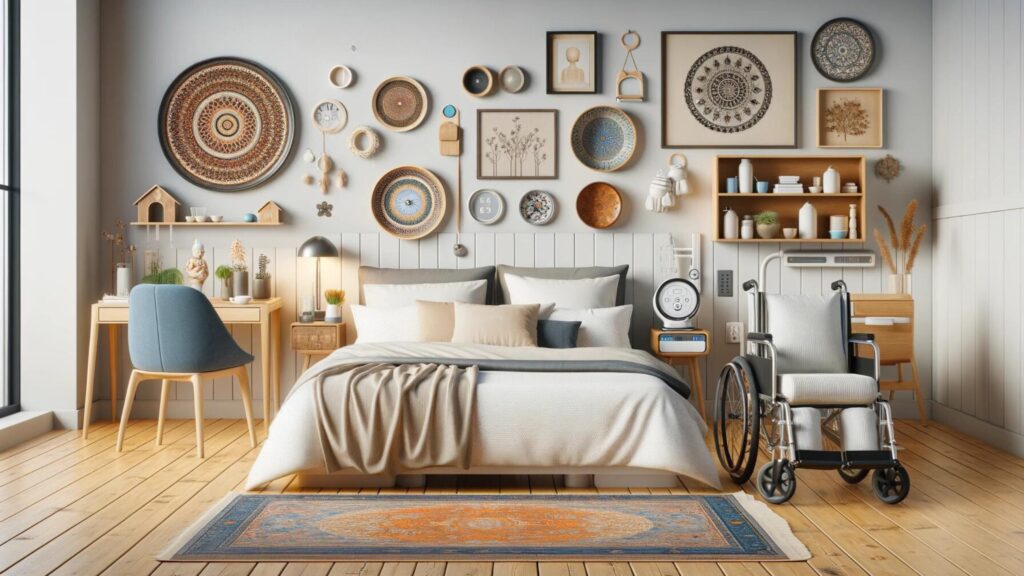
Demographic Differences in Sleep Hygiene
Gender differences in sleep hygiene
Sleep needs and challenges can differ significantly between genders, depending on biological and hormonal factors. Women frequently experience more sleep disturbances as a result of hormonal fluctuations during menstrual cycles, pregnancy, and menopause, which can affect their sleep hygiene. Men, on the other hand, may have a higher incidence of sleep apnea, which can significantly impair sleep quality. Addressing gender-specific sleep hygiene entails tailoring sleep strategies, such as adjusting room temperature or dietary habits, to meet unique biological needs, ensuring that both genders get restorative sleep.
Ethnic and Racial Differences in Sleep Practices
Cultural beliefs and practices influence sleep behaviors across ethnic and racial groups. For example, some cultures may value daytime napping as part of their routine, whereas others may regard it as disruptive. Understanding these distinctions is critical for creating inclusive sleep hygiene programs that respect cultural backgrounds while promoting effective sleep practices globally.
The effects of different life stages on sleep hygiene are significant.
Sleep requirements and patterns change as people progress through life stages, from infants to seniors. Each stage presents distinct challenges; for example, teenagers frequently experience delayed sleep phase syndrome, whereas the elderly may suffer from advanced sleep phase syndrome. Recognizing and adapting sleep hygiene practices to meet the unique needs of each life stage promotes long-term sleep health.
Sleep Hygiene for Shift Workers: Special Considerations
Shift workers face significant challenges in maintaining healthy sleep hygiene due to their irregular working hours, which interfere with the body’s natural circadian rhythm. Strategies such as strategic napping, the use of blackout curtains, and exposure to bright light therapy can help mitigate these effects, allowing shift workers to sleep better and reducing the health risks associated with circadian misalignment.
Treating chronic insomnia and sleep hygiene
Chronic insomnia can be debilitating, making it difficult to practice good sleep hygiene. Treatment frequently includes a combination of behavioral therapy, sleep environment optimization, and, in some cases, medication. Personalized sleep hygiene routines that include regular sleep schedules, relaxation techniques, and minimizing sleep disturbances are critical for effective insomnia management.
Sleep Hygiene for Non-Traditional Work Schedules
Individuals with non-traditional work schedules, such as those in emergency services or hospitality, require specialized sleep hygiene practices to deal with erratic sleep patterns. Creating a flexible but consistent sleep schedule to accommodate these irregular hours is critical for maintaining sleep quality and overall health.
Holistic Approaches to Improve Sleep Hygiene
Holistic approaches to sleep hygiene improve sleep by combining physical, mental, and environmental factors. Yoga, meditation, and the use of essential oils can supplement traditional sleep hygiene measures, resulting in a more comprehensive approach that improves sleep quality and overall well-being.
Sleep Hygiene for Children and Adults: Key Differences
Children and adults have very different sleep requirements and challenges. While adults may benefit from a consistent sleep schedule, children require more hours of sleep and frequently require assistance in developing a bedtime routine that can lay the groundwork for healthy sleep habits throughout their lives. Tailoring sleep hygiene practices to children’s developmental needs, as well as educating adults on how to optimize their own sleep, can result in better health outcomes for people of all ages.
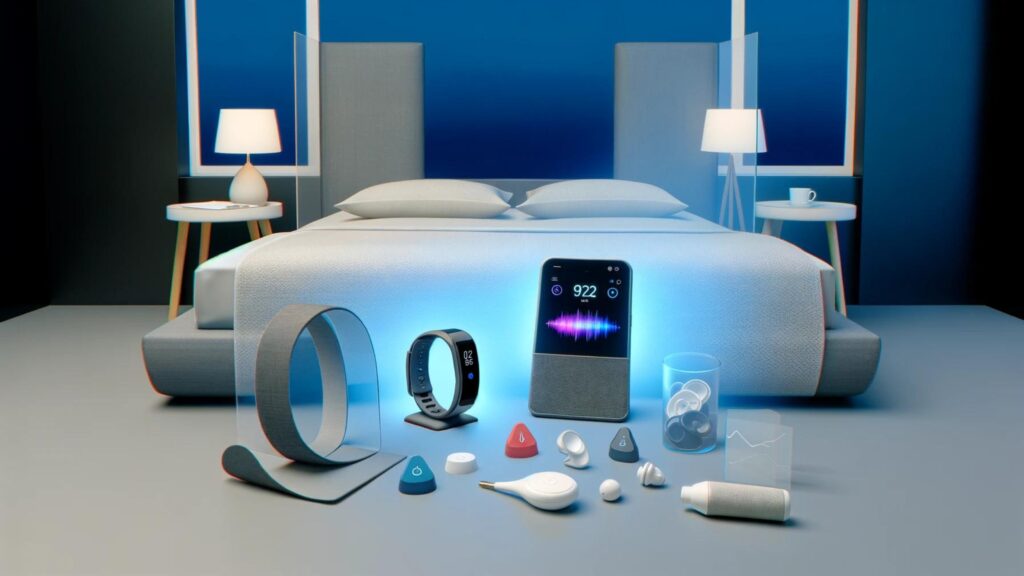
The article discusses advanced strategies and challenges in sleep hygiene.
Long-term Sleep Tracking: Benefits for Sleep Hygiene
Long-term sleep tracking can help improve personal sleep hygiene by revealing sleep patterns and identifying potential disturbances. Individuals can collect data by using devices that monitor sleep phases, heart rate, and movements, allowing them to tailor their sleep environment and routines for optimal rest. This detailed analysis helps people make informed decisions about lifestyle changes and interventions that improve sleep quality over time.
Cognitive Behavioral Therapy (CBT-S) and Sleep Hygiene
Cognitive Behavioral Therapy for Sleep, or CBT-S, is a structured program that assists individuals in changing behaviors and thoughts that interfere with sleep. The CBT-S addresses issues such as sleep anxiety and sleep misconceptions, providing tools for developing a healthier sleep mindset and hygiene. This therapy is a powerful remedy, particularly for insomnia sufferers, and has become a cornerstone in the field of sleep medicine.
Common Obstacles to Maintaining Good Sleep Hygiene
Stress, lifestyle habits, and environmental disruptions can all contribute to poor sleep hygiene. Inconsistent sleep schedules, blue light exposure from screens before bedtime, and inadequate sleep environments are all common challenges. Overcoming these challenges necessitates a commitment to change and a strategic approach to modifying sleep-depriving habits.
We are troubleshooting sleep issues using sleep hygiene techniques.
When sleep issues arise, using specific sleep hygiene techniques can be beneficial. This includes creating a regular sleep schedule, optimizing the bedroom environment for comfort, and practicing relaxation techniques before bedtime. Each strategy addresses specific aspects of sleep disruption, offering a comprehensive toolkit for individuals who struggle with sleep.
When to seek professional help for sleep hygiene concerns
Self-managed sleep hygiene adjustments may not always be sufficient, especially in cases of chronic insomnia, sleep apnea, or other sleep-related medical conditions. Seeking professional assistance from a sleep specialist or a healthcare provider can offer a diagnosis and customized treatment options, guaranteeing the appropriate address and management of underlying health issues.
The effects of aging on sleep hygiene are significant.
Aging changes sleep architecture, including sleep patterns, duration, and quality. Older adults may wake up more frequently and sleep more lightly. Adapting sleep hygiene practices to these changes, such as changing sleep schedules and improving sleep environment comfort, can help reduce the impact of aging on sleep.
The impact of medication on sleep hygiene is a significant topic.
Various medications have a significant impact on sleep quality and hygiene. Some may cause sleepiness, while others may lead to insomnia. Understanding these side effects is critical for managing medication regimens in a way that reduces the impact on sleep. Consulting with healthcare providers about medication timing and potential side effects can help you maintain good sleep hygiene.
Seasonal Affective Disorder and Sleep Hygiene
Seasonal Affective Disorder (SAD) is a type of depression that occurs at the same time every year, most commonly during the winter, and can have a negative impact on sleep hygiene. Using light therapy, adhering to a consistent sleep schedule, and engaging in outdoor activities during the day to increase exposure to natural light can alleviate oversleeping, daytime fatigue, and disrupted sleep patterns.
- Introduction to Sleep Hygiene
- Sleep hygiene is the foundation of good health.
- Understanding Sleep Hygiene: What It Actually Means
- Sleep Hygiene's Crucial Role in Daily Life
- Sleep Hygiene: Key Components for Restful Nights
- The Science of Sleep Hygiene: How It Works
- Myths and misconceptions about sleep hygiene
- Assessing Your Current Sleep Hygiene: A Self-Assessment
- Setting the Stage: Getting Ready for a Deep Dive into Sleep Hygiene
- Environmental and lifestyle factors that influence sleep hygiene
- Sleep hygiene and the bedroom environment
- Optimized lighting for improved sleep hygiene
- The role of sound in sleep hygiene
- Temperature and Humidity: Their Influence on Sleep Hygiene
- Sleep Hygiene: The Value of Bed Quality
- Aromatherapy and Sleep Hygiene: Scents to Relax
- Technological Distractions: Managing Devices for Better Sleep Hygiene
- Dietary Supplements and Their Impact on Sleep Hygiene
- Behavioral and psychological adjustments for improved sleep
- Creating the Ideal Nighttime Ritual: Sleep Hygiene and Evening Routines
- Dietary habits and their impact on sleep hygiene
- The influence of exercise on sleep hygiene is significant.
- Mindfulness and Relaxation Techniques to Improve Sleep Hygiene
- Effective Sleep Hygiene: Mental Health's Role
- Managing stress and anxiety for better sleep
- The impact of both legal and illegal substances on sleep quality
- Sleep Hygiene: Preparing Your Mind for Rest
- Demographic Differences in Sleep Hygiene
- Gender differences in sleep hygiene
- Ethnic and Racial Differences in Sleep Practices
- The effects of different life stages on sleep hygiene are significant.
- Sleep Hygiene for Shift Workers: Special Considerations
- Treating chronic insomnia and sleep hygiene
- Sleep Hygiene for Non-Traditional Work Schedules
- Holistic Approaches to Improve Sleep Hygiene
- Sleep Hygiene for Children and Adults: Key Differences
- The article discusses advanced strategies and challenges in sleep hygiene.
- Long-term Sleep Tracking: Benefits for Sleep Hygiene
- Cognitive Behavioral Therapy (CBT-S) and Sleep Hygiene
- Common Obstacles to Maintaining Good Sleep Hygiene
- We are troubleshooting sleep issues using sleep hygiene techniques.
- When to seek professional help for sleep hygiene concerns
- The effects of aging on sleep hygiene are significant.
- The impact of medication on sleep hygiene is a significant topic.
- Seasonal Affective Disorder and Sleep Hygiene
- Cultural, economic, and community influences on sleep hygiene
- Cultural variations in sleep hygiene practices
- Psychological barriers to good sleep hygiene
- Economic factors influencing sleep hygiene
- Educating others on sleep hygiene
- The Future of Sleep Hygiene: Trends and Innovations
- Personal Stories: Transformations Through Improved Sleep Hygiene
- Creating a Better Sleep Hygiene Community
- The relationship between sleep hygiene and immune system function
- Sleep Hygiene: A Step-by-Step Guide to Easily Achieving Restful Nights
- Frequently Asked Questions About Sleep Hygiene: Effortlessly Unlock Restful Nights
- What is sleep hygiene?
- Why is proper sleep hygiene important?
- How can I improve my sleep environment so that it promotes better sleep hygiene?
- What are the best pre-sleep routine tips?
- How does diet influence sleep hygiene?
- Is it okay to nap during the day if I follow good sleep hygiene?
- What should I do if I am unable to fall asleep?
- How does exercise affect sleep hygiene?
- Conclusion
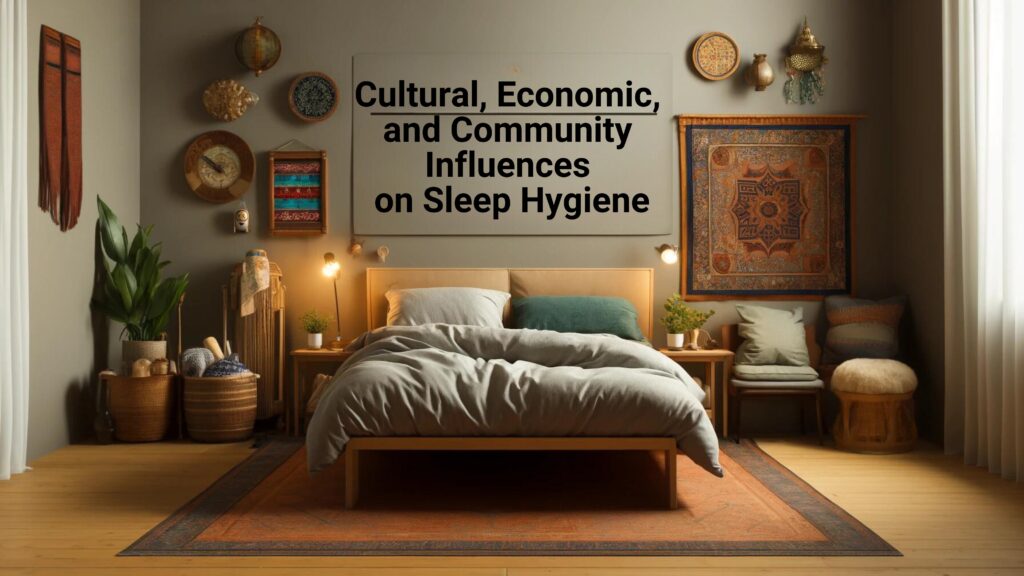
Cultural, economic, and community influences on sleep hygiene
Cultural variations in sleep hygiene practices
Sleep hygiene practices vary greatly across cultures, reflecting a diverse set of beliefs, habits, and environmental factors. Siestas are an important part of daily life in some cultures, but late-night social gatherings are more common in others. Understanding these variations is critical for creating globally applicable sleep hygiene recommendations that respect cultural norms while promoting health.
Psychological barriers to good sleep hygiene
Psychological barriers such as stress, anxiety, and misinformation about sleep can seriously disrupt sleep hygiene. To overcome these barriers, targeted educational efforts must address common myths and provide practical strategies for managing mental health in relation to sleep. Overcoming these psychological barriers is critical to creating a culture of good sleep hygiene.
Economic factors influencing sleep hygiene
Economic status can have a significant impact on one’s ability to maintain good sleep hygiene. Those in lower socioeconomic brackets may face challenges such as noisy environments, limited healthcare access, and work schedules that disrupt natural sleep patterns. Addressing economic disparities is critical to ensuring that effective sleep hygiene practices are available to all members of society.
Educating others on sleep hygiene
Education is a powerful tool for promoting good sleep hygiene. By incorporating sleep education into schools, workplaces, and community programs, we can raise sleep awareness and teach effective sleep hygiene practices. This proactive approach not only improves individual health, but it also promotes a healthier and more productive community.
The Future of Sleep Hygiene: Trends and Innovations
The future of sleep hygiene appears bright, with new technological and therapeutic advances emerging on a regular basis. Wearable sleep trackers, smart home systems that optimize bedroom environments, and personalized sleep coaching are just a few of the ways technology is changing the way we approach sleep hygiene. Keeping up with these trends is critical for maintaining cutting-edge practices in sleep health.
Personal Stories: Transformations Through Improved Sleep Hygiene
Personal transformation stories that result from improved sleep hygiene can be profoundly inspiring. These stories emphasize the life-changing benefits of prioritizing sleep, which range from improved mental clarity and emotional stability to better physical health. Sharing these success stories can inspire others to prioritize their sleep hygiene and achieve similar results.
Creating a Better Sleep Hygiene Community
Creating a community committed to sleep hygiene can enhance the efficacy of individual endeavors. Community support groups, online forums, and local health workshops offer opportunities to share experiences, tips, and encouragement. These communities serve as a resource for those struggling with sleep issues as well as a beacon for promoting widespread sleep habit change.
The relationship between sleep hygiene and immune system function
Recent research has demonstrated a direct link between sleep hygiene and immune system function. Adequate sleep boosts the immune response, whereas sleep deprivation weakens it, making the body more susceptible to infections. Understanding this relationship is critical for communicating the significance of sleep hygiene as a fundamental component of overall health and well-being.
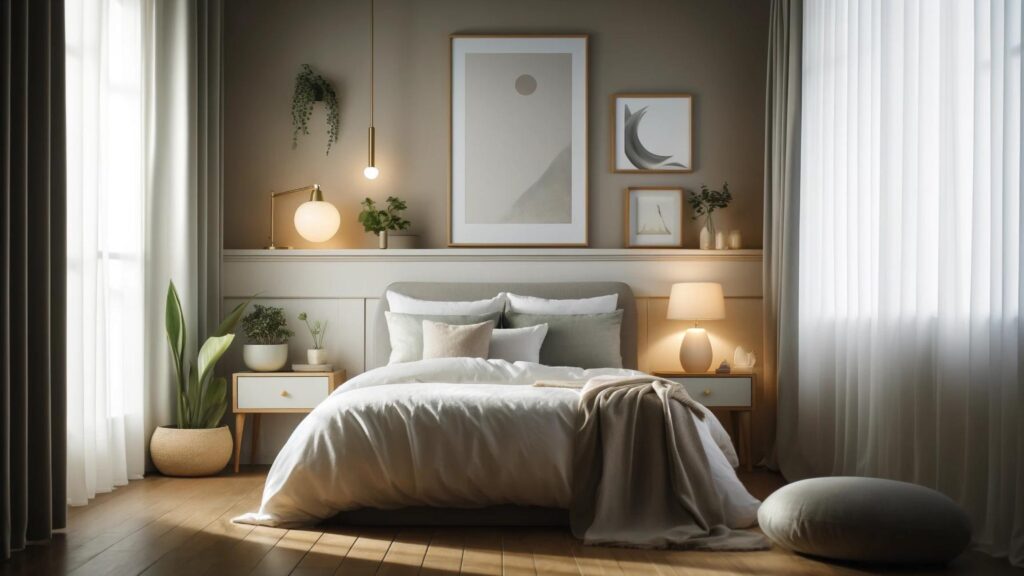
Sleep Hygiene: A Step-by-Step Guide to Easily Achieving Restful Nights
Achieving restful sleep is more than just hitting the pillow after a long day. It is important to consistently practice good sleep hygiene in order to optimize your sleep environment and habits. This guide will walk you through practical steps for improving your sleep quality every night.
Step 1: Set a Consistent Sleep Schedule
Clarification: Go to bed and wake up at the same time every day, including weekends. This regularity strengthens your body’s sleep-wake cycle. For example, if you choose to sleep at 10 p.m., make sure you’re in bed by that time every night, with the goal of waking up at 6 a.m.
Step 2: Establish a Pre-Sleep Routine
Clarification: Engage in relaxing activities that tell your body it’s time to unwind, lowering stress and anxiety. For example, an hour before bed, you could take a warm bath, read a book, or practice relaxation techniques such as gentle yoga or deep breathing.
Step 3: Optimize your bedroom environment.
Clarification: Make your bedroom conducive to sleep. This includes controlling the temperature, lighting, and noise. Keep your bedroom at a cool 65 degrees Fahrenheit, use blackout curtains to block out light, and consider a white noise machine to drown out distracting noises.
Step 4: Be mindful of eating and drinking.
Clarification: Avoid large meals, caffeine, and alcohol before bedtime because they can disrupt sleep. For example, eat your last large meal at least 2–3 hours before bedtime. If you need a snack, opt for something light, such as yogurt or a banana.
Step 5: Limit Naps
Clarification: While napping can help you catch up on missed sleep, long or irregular naps can have an impact on your nighttime sleep quality. If you must nap, keep it brief—about 20–30 minutes—and avoid napping late in the day.
Step 6: Exercise regularly, but not before bedtime.
Clarification: Regular physical activity can help you fall asleep faster and sleep deeper, but timing is critical. For example, try to exercise at least three hours before bedtime to avoid any stimulation that may keep you awake.
Step 7: Manage concerns
Clarification: Try to resolve any worries or concerns before going to bed. Stress management techniques can be useful. For example, write down your thoughts and set them aside for tomorrow. Meditation or mindfulness practices can also be beneficial for clearing your mind.
Step 8: Use technology wisely.
Clarification: Limit your exposure to screens before bed, as the blue light they emit can interfere with your ability to fall asleep. For example, turn off all electronic devices at least one hour before bedtime. Instead, consider using this time to engage in non-screen activities that help you relax.
By incorporating these steps into your daily routine, you can improve your sleep hygiene and discover the secret to restful, effortless nights. Begin small, making one or two changes, and gradually progress to a comprehensive sleep hygiene regimen. Your body and mind will thank you for better sleep and more energy during the day.
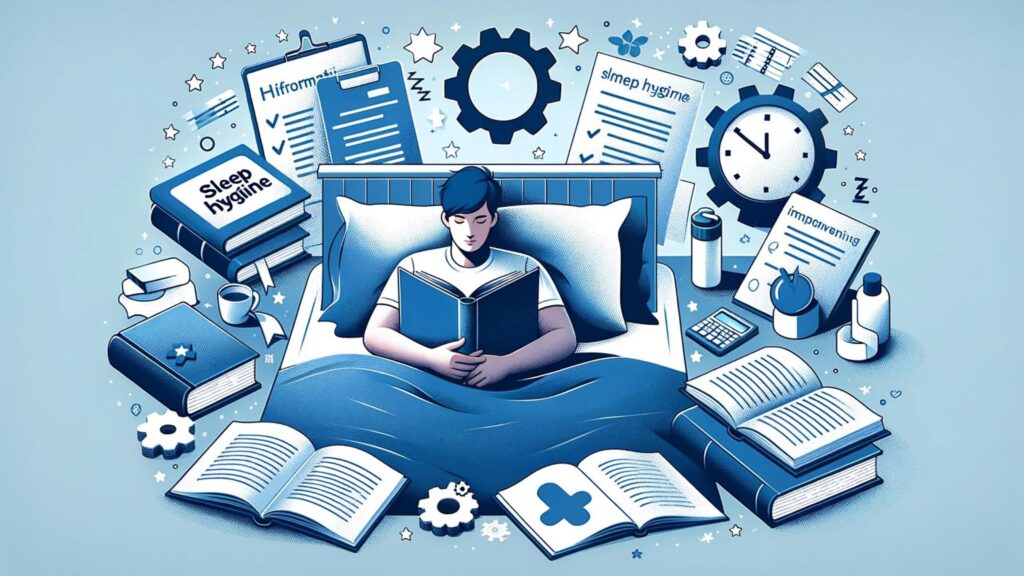
Frequently Asked Questions About Sleep Hygiene: Effortlessly Unlock Restful Nights
What is sleep hygiene?
Answer: Sleep hygiene refers to the practices and habits that promote regular, restful sleep. It includes things like improving your sleep environment, sticking to a consistent sleep schedule, and making lifestyle choices that promote restful sleep.
Why is proper sleep hygiene important?
Answer: Good sleep hygiene is important because it improves both the quality and duration of sleep. Consistently, good sleep has been linked to improved mental and physical health, increased cognitive function, better mood regulation, and a higher overall quality of life.
How can I improve my sleep environment so that it promotes better sleep hygiene?
Answer: To improve your sleeping environment, reduce noise and light in your bedroom, keep it cool (65 degrees Fahrenheit is ideal for most people), and make sure your bedding is comfortable. Additionally, use your bed solely for sleep and intimacy to reinforce the link between bed and sleep.
What are the best pre-sleep routine tips?
Answer: A good pre-sleep routine might include activities that help you unwind, such as reading a book, taking a warm bath, or practicing relaxation techniques like deep breathing or meditation. Avoid stimulating activities before bedtime, such as using electronic devices or watching exciting television shows.
How does diet influence sleep hygiene?
Answer: What you eat has a significant impact on your sleep quality. Avoid heavy meals, caffeine, and alcohol before bedtime because they can disrupt sleep. If you’re hungry, choose a light snack like a banana or a small bowl of whole-grain cereal with milk, which can help you sleep without making you feel uncomfortable.
Is it okay to nap during the day if I follow good sleep hygiene?
Answer: Napping can be beneficial, especially if you do not get enough sleep at night. To maintain good sleep hygiene, limit naps to 20–30 minutes and avoid taking them late in the day, as this can interfere with your ability to fall asleep at night.
What should I do if I am unable to fall asleep?
Answer: If you can’t fall asleep after 20 minutes, get out of bed and do something quiet and non-stimulating, like reading in soft lighting. Avoid using screens or anything too engaging. When you feel tired, return to bed. This can help break the link between stress and anxiety in your bed.
How does exercise affect sleep hygiene?
Answer: Regular exercise can significantly improve the quality of your sleep, particularly if done consistently. However, avoid strenuous exercise close to bedtime because it can have a stimulating effect. Try to finish any strenuous workouts at least three hours before going to bed.
Conclusion
Sleep hygiene is essential for anyone who wants to improve their quality of life by getting more rest. Practicing good sleep hygiene improves your mental, physical, and emotional health. Learn more about optimizing your nightly routines by browsing our collection of articles dedicated to improving sleep hygiene and waking up to a brighter, more energetic you!

